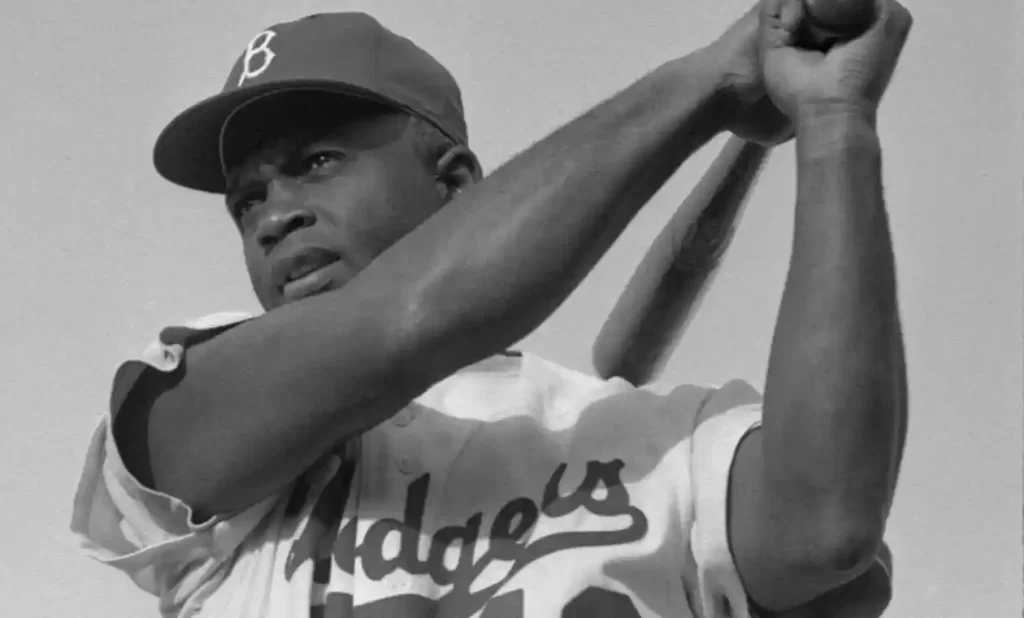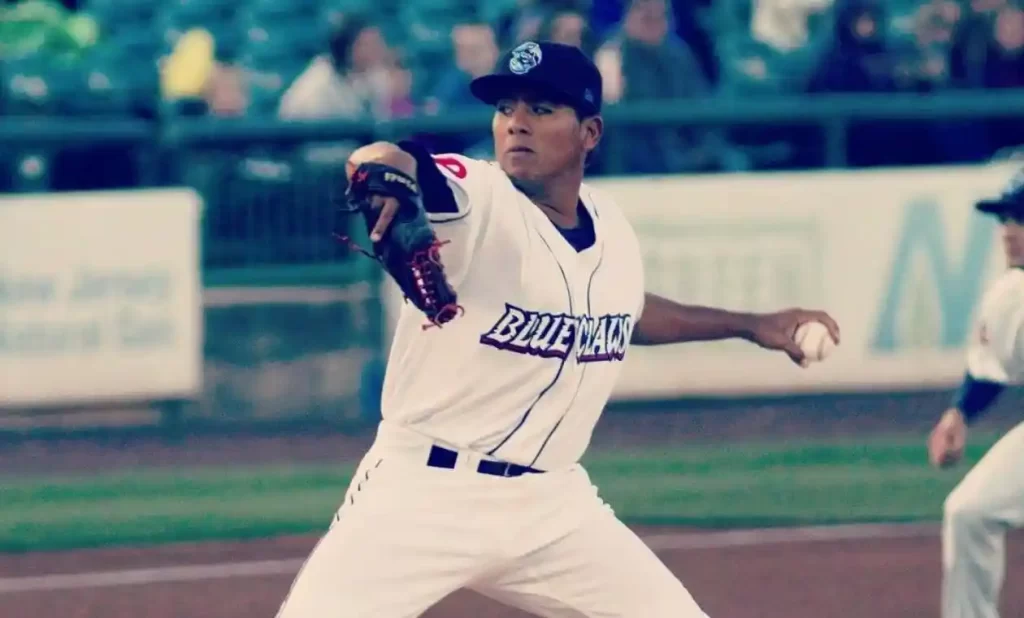
In the annals of baseball history, one name shines as brightly as the stadium lights themselves – Jackie Robinson. The mention of his name transcends the sport, echoing far beyond the confines of the ballpark. But who was this man, and why does his legacy still resonate today?
Jackie Robinson was not merely a baseball player; he was a trailblazer. Born on January 31, 1919, in Cairo, Georgia, he grew up to become a symbol of courage, resilience, and change. His journey in baseball wasn’t just about hitting home runs and stealing bases; it was about shattering barriers.
In a time when the color of one’s skin often determined the boundaries of opportunity, Jackie Robinson emerged as a beacon of hope. He made history on April 15, 1947, when he stepped onto Ebbets Field as a Brooklyn Dodger, becoming the first African American to play in Major League Baseball.
Robinson’s significance in baseball lies not only in his remarkable athletic abilities but in the profound impact he had on the sport’s social and cultural landscape. He wasn’t just a player; he was a catalyst for change, challenging the status quo and ushering in a new era of inclusivity.
In this journey through Jackie Robinson’s life and legacy, we’ll delve into the story of a man who dared to dream beyond the confines of segregation, defied adversity, and ultimately left an indelible mark on the game of baseball and the world beyond. Join us as we explore the remarkable life of Jackie Robinson, the significance of retiring his number 42, and the enduring impact of his journey.
Jackie Robinson Career Statistics
| Statistic | Career Total |
| Batting Average | .311 |
| Hits | 1,518 |
| Home Runs | 137 |
| Runs Batted In | 734 |
| Stolen Bases | 197 |
| Runs Scored | 947 |
Jackie Robinson’s Early Struggles and Ascent in Baseball
Jackie Robinson’s journey to becoming a baseball legend began with humble origins and a deep-seated love for the game. Born on January 31, 1919, in Cairo, Georgia, he grew up in a time when racial segregation and discrimination cast long shadows over the lives of African Americans.
Robinson’s early life was marked by challenges and adversities. His family moved to Pasadena, California, where he attended John Muir High School. Here, his athletic talents began to shine. He became a star athlete, excelling in multiple sports, including football, basketball, track, and of course, baseball.
Baseball was a particular passion for Robinson. He played for the semi-professional football team, the Honolulu Bears, and was later drafted into the U.S. Army during World War II. While in the Army, Robinson was court-martialed for refusing to move to the back of a segregated bus—an early display of his unwavering commitment to principles of equality and justice.
After his service, Robinson’s talent for baseball caught the attention of Branch Rickey, the general manager of the Brooklyn Dodgers. This pivotal moment in baseball history led to Robinson’s signing with the Montreal Royals, a minor league team affiliated with the Dodgers.
Robinson’s journey continued as he moved from the Royals to the Dodgers, making history on April 15, 1947, when he stepped onto Ebbets Field as the first African American to play in Major League Baseball.
Before his groundbreaking debut in the Major Leagues, Robinson honed his baseball skills and faced significant challenges in the Negro Leagues, where many African American players found opportunities to showcase their talents. The Negro Leagues were instrumental in developing Robinson’s abilities and resilience, preparing him for the rigors of the Major Leagues.
Robinson’s achievements in the Negro Leagues are an integral part of his baseball legacy, and they serve as a testament to his determination to overcome the racial barriers of his time. His early experiences in baseball laid the foundation for the iconic career that would follow, making him a symbol of hope and change for generations to come.
Jackie Robinson’s Historic Journey and the Shattering of Baseball’s Color Barrier
Jackie Robinson’s name is forever etched in the annals of history for one profound reason: he broke the color barrier in Major League Baseball. On April 15, 1947, as he donned the Brooklyn Dodgers’ uniform and stepped onto Ebbets Field, he embarked on a journey that would forever alter the landscape of American sports and society.
The color barrier, an unwritten rule deeply ingrained in baseball, had barred African American players from competing in the Major Leagues for decades. Robinson’s entry into the league challenged this discriminatory norm, and the challenges he faced were immense.
From the moment he entered the league, Robinson was subjected to a barrage of racial slurs, insults, and discrimination. Opposing players, fans, and even some teammates did not hide their bigotry. Despite the adversity, Robinson persevered with remarkable grace and composure.
His performance on the field silenced many of his detractors. In his rookie season, he batted .297, scored 125 runs, and led the league in stolen bases. He was named the National League’s Rookie of the Year, a testament to his undeniable talent.
But Robinson’s impact extended beyond statistics. He became a symbol of hope and change during a time of intense racial segregation. His success in the Major Leagues opened doors for countless African American players who followed in his footsteps.
The significance of his actions was not limited to the baseball diamond. Robinson’s courage and dignity inspired movements for civil rights and equality. His journey symbolized the power of resilience and determination, and it played a pivotal role in the larger struggle for social justice.
Jackie Robinson’s historic journey as a trailblazer in baseball was a turning point in American history. His legacy continues to inspire and serves as a reminder that individuals can affect transformative change, even in the face of adversity and prejudice. Robinson’s actions went far beyond the confines of the ballpark, leaving an enduring impact on the world.
Jackie Robinson’s Enduring Significance in Baseball and Civil Rights
Jackie Robinson’s importance in the history of baseball and civil rights is immeasurable. His legacy transcends the world of sports, reaching far into the realms of social change, equality, and inspiration. Robinson’s enduring significance can be attributed to several key factors that have left an indelible mark on the sport and society as a whole.
Breaking the Racial Barrier
Jackie Robinson’s most iconic achievement was breaking the racial barrier in Major League Baseball. His courage and determination shattered the longstanding segregation that had plagued the sport for decades. His mere presence on the field challenged deeply rooted prejudices and norms. Robinson became a symbol of hope for African Americans, proving that talent and character knew no color boundaries.
Paving the Way for Others
Robinson’s entry into the Major Leagues opened the door for other African American players. His success led to a wave of talented black athletes joining the ranks of professional baseball. Many of these players, such as Willie Mays and Hank Aaron, would go on to become legends in their own right. Robinson’s legacy, therefore, extends to the countless individuals who followed in his footsteps.
Civil Rights and Social Change
Beyond baseball, Robinson’s actions ignited the civil rights movement. He demonstrated that the fight for equality was not limited to the courtroom or the protest march; it could be waged on the sports field. His dignified response to racism and discrimination inspired others to challenge injustice. Robinson’s legacy is intertwined with the broader struggle for civil rights in the United States.
Cultural Icon
Robinson’s impact reverberated through popular culture. He became a symbol of hope and progress, and his image was often used to promote messages of equality. His life story was featured in books, films, and documentaries. The number 42, retired by Major League Baseball in his honor, became an iconic symbol of his legacy.
Inspiration for Future Generations
Jackie Robinson’s legacy continues to inspire people of all backgrounds. His story serves as a reminder that courage, resilience, and principle can bring about profound change. The lessons from his life are timeless and provide guidance for those who seek to make a positive impact in their own communities.
Jackie Robinson’s importance in baseball and civil rights is not confined to the past; it lives on in the continued quest for justice, equality, and the belief that one person can make a profound difference. His legacy is a testament to the enduring power of the human spirit to overcome adversity and inspire positive change.
The Significance of Jackie Robinson’s Retired Number and Jackie Robinson Day
In the world of baseball, numbers are more than just digits; they are symbols of greatness, achievements, and legacies. None stands as tall as the number 42, and its story is deeply entwined with the remarkable life and career of Jackie Robinson.
Retiring Number 42: A Monumental Tribute
On April 15, 1997, Major League Baseball made a historic decision – they retired the number 42 across all of baseball. This unprecedented move was a tribute to the indomitable spirit of Jackie Robinson and his role in breaking the color barrier. It was a gesture of immense significance, signifying that Robinson’s legacy was not just limited to one team or one era, but was woven into the very fabric of the sport.
The retirement of number 42 meant that no player in any Major League Baseball team could ever wear that number again, except for those who were already wearing it at the time of the decision. This action was a testament to Robinson’s impact, not only as a player but as a symbol of courage and change. It ensured that every player, regardless of their background, would forever carry a piece of Robinson’s legacy onto the field.
Jackie Robinson Day: A Day of Celebration and Remembrance

To honor Jackie Robinson and his enduring legacy, Major League Baseball designated April 15th as “Jackie Robinson Day.” On this day, every player, coach, and umpire in the league wears the number 42 on their jerseys, further emphasizing the unity and inclusivity that Robinson’s actions brought to the game.
Jackie Robinson Day is not just a commemoration; it’s a celebration of the values Robinson stood for—equality, justice, and the power of one individual to inspire change. It’s a day to remember his impact on the sport and society as a whole.
The significance of retiring number 42 and establishing Jackie Robinson Day extends beyond baseball. It is a reminder that sports can be a powerful force for social change and that the legacy of one individual can influence generations to come. As we celebrate Jackie Robinson Day each year, we pay homage to a remarkable man who changed the course of history through the game he loved.
The Life Beyond Baseball: Business Ventures, Social Activism, and Legacy
After an illustrious baseball career, Jackie Robinson’s life took on new dimensions, demonstrating his commitment to both business and social activism. His post-baseball journey showcased his unwavering dedication to causes that extended far beyond the confines of the baseball diamond.
Life After Baseball
Jackie Robinson retired from professional baseball in 1957 after a career filled with remarkable achievements. However, his retirement did not mark the end of his involvement in the world of sports. He pursued a variety of business ventures, notably becoming the first African American to own a Ford dealership. This venture was groundbreaking in its own right, reflecting Robinson’s persistent efforts to break down racial barriers in various sectors.
Social Activism
Robinson’s life was marked by an unceasing commitment to social activism. He was a vocal advocate for civil rights, consistently using his platform to address issues of racial inequality and discrimination. His stance was particularly evident during the Civil Rights Movement of the 1960s, where he participated in various demonstrations and protests, lending his voice to the cause.
Robinson’s legacy of activism extended to his writing as well. He penned a regular column in the New York Post, where he discussed issues of race, politics, and social justice. His writing provided valuable insights and perspectives, contributing to the ongoing conversations surrounding equality.
Age at the Time of Passing
On October 24, 1972, Jackie Robinson passed away at the age of 53. His life was tragically cut short, but his impact on the world far exceeded his years. Robinson’s memory lives on through his contributions to baseball, civil rights, and the enduring inspiration he provides to those who continue to fight for justice and equality.
Jackie Robinson’s later life was a testament to the idea that life after sports can be just as impactful as the years spent on the field. His business endeavors, advocacy for civil rights, and his lasting legacy exemplify a life dedicated to making a difference. Robinson’s influence goes far beyond the sport of baseball, and his spirit continues to inspire change-makers in all walks of life.
The Decisions of a Pioneer: Jackie Robinson’s Legacy and Choices
Jackie Robinson’s life was marked by a series of courageous decisions that reverberated throughout the world of sports and society. These choices were not only reflective of his unwavering principles but also had a profound impact on his life and the sport of baseball.
Breaking the Color Barrier
Robinson’s most pivotal decision was to break the color barrier in Major League Baseball. This choice was made not just for personal glory but as a commitment to challenging the systemic racism that pervaded the sport. He understood the weight of his actions and the potential consequences, yet he chose to move forward, paving the way for countless others. The impact of this decision was seismic, and it led to greater inclusivity in baseball and society.
Perseverance in the Face of Adversity
Robinson faced immense adversity as the first African American in the Major Leagues. The decision to maintain his composure and dignity in the face of racial slurs, threats, and discrimination was a reflection of his strength of character. His choices exemplified the power of resilience and set an example for others to follow.
Advocate for Civil Rights
Robinson’s decision to use his platform for advocacy was another defining choice. He recognized the importance of addressing racial inequality beyond the baseball field. His columns, speeches, and participation in civil rights demonstrations were decisions rooted in a deep sense of social responsibility. These choices had a lasting impact on the Civil Rights Movement and the broader quest for equality.
Life Beyond Baseball
After retiring from baseball, Robinson made a deliberate decision to pursue business ventures and social activism. His entrepreneurial spirit and dedication to advocacy were motivated by a desire to continue his efforts to break down barriers and promote equality.
Legacy and Inspiration
Perhaps Robinson’s most enduring decision was the legacy he left behind. His life choices continue to inspire individuals of all backgrounds to stand up against injustice, challenge the status quo, and use their voices for change. His impact extends far beyond his playing days, reminding us that one person’s choices can have a lasting and transformative effect on the world.
Jackie Robinson’s decisions, whether on the baseball field or in the realm of civil rights, were marked by courage, principle, and a commitment to a more just and equal society. His legacy is a testament to the enduring impact of choices rooted in strength, determination, and a vision of a better world for all.
Conclusion
In the annals of history, certain individuals stand as beacons of courage and catalysts for change. Among them, Jackie Robinson’s name shines brightly, not only in the world of baseball but in the broader tapestry of American society. His enduring importance and contributions leave an indelible mark, reminding us of the boundless power of one person to effect profound transformation.
Jackie Robinson’s decision to break the color barrier in Major League Baseball was a pivotal moment in sports history. It challenged entrenched discrimination and reshaped the course of the game, opening doors for African American players who would follow. His legacy as a player was remarkable, but his contributions extended far beyond the field.
His courage in the face of adversity, his advocacy for civil rights, and his dedication to social justice were all emblematic of his unwavering commitment to equality. Robinson’s choices exemplified the strength of character and the profound impact one individual could have on the world.
As we reflect on his legacy, we are reminded that Jackie Robinson was not simply a baseball icon; he was a symbol of hope, change, and the enduring struggle for justice. His story continues to inspire generations, encouraging us to stand up against injustice, challenge the status quo, and use our voices to create a more equitable and inclusive society.
In commemorating Jackie Robinson’s contributions, we honor a pioneer who left a lasting legacy in baseball and civil rights. His story serves as a testament to the enduring importance of courage, resilience, and the belief that one person can make a world of difference.

Meet Daniel Anderson, the heart and soul behind Baseball Pro Picks. At 49, Daniel’s life has revolved around baseball, a passion that’s as strong today as it was when he first fell in love with the game. Living in the USA, Daniel has dedicated countless hours to watching, analyzing, and understanding every pitch, hit, and home run, making almost no game missed. His deep-rooted love for the sport is matched only by his commitment to sharing insightful, expert analysis with fellow baseball enthusiasts. With decades of experience and a keen eye for the game’s nuances, Daniel brings a unique perspective that enriches Baseball Pro Picks. Trust Daniel to guide you through the intricacies of baseball with the authority and trustworthiness of a true aficionado.












